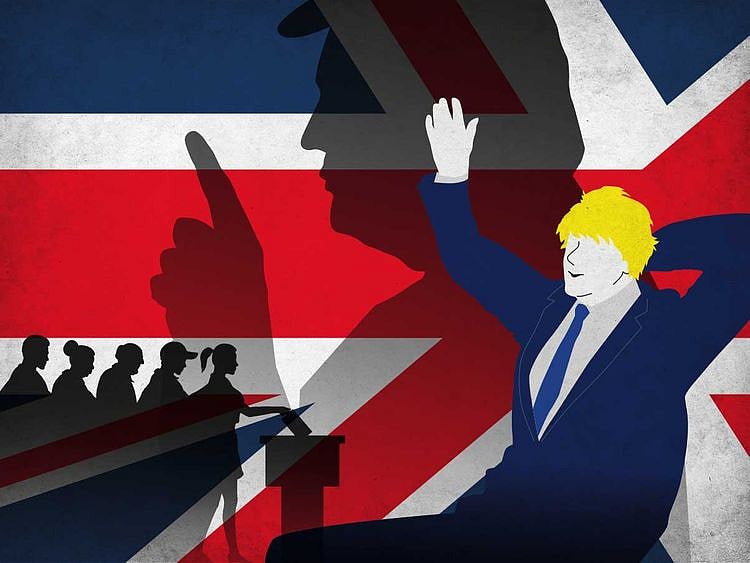Donald Trump, in his telling, could have shot somebody on Fifth Avenue and won.
Boris Johnson could mislead the queen. He could break his promise to get Britain out of Europe by October 31. He could lie about Turks invading Britain and the cost of European Union membership. He could make up stories about building 40 new hospitals. He could double down on the phantom $460 million (Dh1.68 billion) a week that Brexit would deliver to the National Health Service — and still win a landslide Tory electoral victory not seen since Margaret Thatcher’s triumph in 1987.
The British, or at least the English, did not care. Truth is so 20th century. They wanted Brexit done, and, formally speaking, Johnson will now take Britain out of Europe by January 31, even if all the tough decisions on relations with the union will remain.
Johnson was lucky.
In the pathetic, emetic Jeremy Corbyn, the soon-to-depart Labour Party leader, he faced perhaps the worst opposition candidate ever. In the Tory press, he had a ferocious friend prepared to overlook every failing. In Brexit-weary British subjects, whiplashed since the 2016 referendum, he had the perfect receptacle for his “get Brexit done.”
Johnson was also skilful, blunting Nigel Farage’s far-right Brexit Party, which stood down in many seats, took a lot of Labour votes in the seats where it did run, and ended up with nothing. The British working class, concentrated in the Midlands and the North, abandoned Labour and Corbyn’s socialism for the Tories and Johnson’s nationalism.
In the depressed provinces of institutionalised precariousness, workers embraced an old Etonian mouthing about unleashed British potential. Not a million miles from blue-collar heartland Democrats migrating to Trump the millionaire and America First demagogy.
That’s not the only parallel with American politics less than 11 months from the election. Johnson concentrated all the Brexit votes. By contrast, the pro-Remain vote was split among Corbyn’s internally divided Labour Party, the hapless Liberal Democrats and the Scottish National Party.
British working class rejects Labour
For anybody contemplating the divisions of the Democratic Party as compared with the Trump movement’s fanatical singleness of purpose, now reinforced by the impeachment proceedings, this can only be worrying.
The clear rejection of Labour’s big-government socialism also looks ominous for Democrats who believe the party can lurch left and win. The British working class did not buy nationalised railways, electricity distribution and water utilities when they could stick it to some faceless bureaucrat in Brussels and — in that phrase as immortal as it is meaningless — take back their country.
It’s a whole new world. To win, liberals have to touch people’s emotions rather than give earnest lessons. They have to cease being arid. They have to refresh and connect. It’s not easy.
Facebook reaches about one-third of humanity.
It is more powerful than any political party — and it’s full of untruths, bigotry and nonsense.
Story of Boris and Brexit
As Sacha Baron Cohen, the British actor, said last month of the social media behemoths: “The truth is that these companies won’t fundamentally change because their entire business model relies on generating more engagement, and nothing generates more engagement than lies, fear and outrage.”
That’s the story of Brexit, a national tragedy. That’s the story of Johnson, the man of no convictions. That’s the story of Trump, who makes puppets of people through manipulation of outrage and disregard for truth. That’s the story of our times. Johnson gets and fits those times better than most. He’s a natural.
“Brexit and Trump were inextricably linked in 2016, and they are inextricably linked today,” Steve Bannon told me. “Johnson foreshadows a big Trump win. Working-class people are tired of their ‘betters’ in New York, London, Brussels telling them how to live and what to do. Corbyn the socialist programme, not Corbyn the man, got crushed. If Democrats don’t take the lesson, Trump is headed for a Reagan-like ‘84 victory.”
I still think Trump can be beaten, but not from way-out left and not without recognition that, as Hugo Dixon, a leader of the now defeated fight for a second British referendum, put it: “There is a crisis of liberalism because we have not found a way to connect to the lives of people in the small towns of the postindustrial wasteland whose traditional culture has been torn away.”
Johnson, even with his 80-seat majority, has problems. His victory reconciled the irreconcilable. His moneyed coterie wants to turn Britain into free-market Singapore on the Thames. His new working-class constituency wants rule-Britannia greatness combined with state-funded support. That’s a delicate balancing act. The breakup of Britain has become more likely. The strong Scottish National Party showing portends a possible second Scottish referendum on independence.
This time I would bet on the Scots bidding farewell to little England. And then there’s the small matter of what Brexit actually means. Johnson will need all his luck with that.
As my readers know, I am a passionate European patriot who sees the union as the greatest achievement of the second half of the 20th century and Britain’s exit as an appalling act of self-harm. But I also believe in democracy. Johnson took the decision back to the people and won. His victory must be respected. The fight for freedom, pluralism, the rule of law, human rights, a free press, independent judiciaries, breathable air, peace, decency and humanity continues — and has only become more critical now that Britain has marginalised itself irreversibly in a fit of nationalist delusion.
— Roger Cohen is an opinion columnist of The New York Times. He writes on international affairs and diplomacy.
Sign up for the Daily Briefing
Get the latest news and updates straight to your inbox
Network Links
GN StoreDownload our app
© Al Nisr Publishing LLC 2025. All rights reserved.
